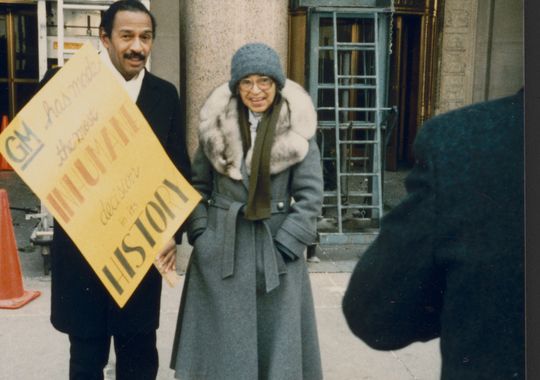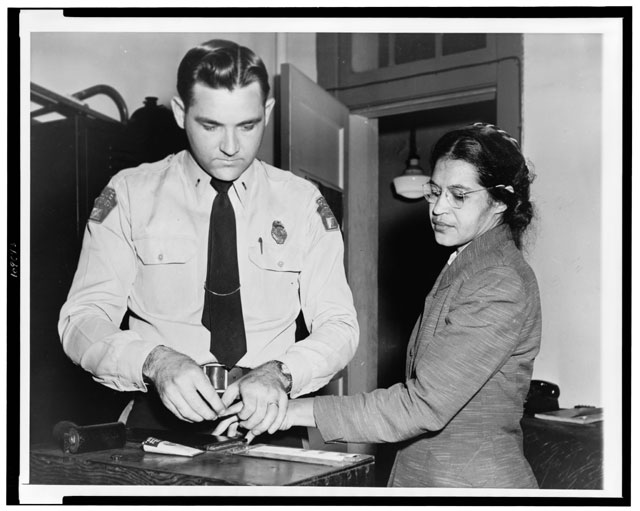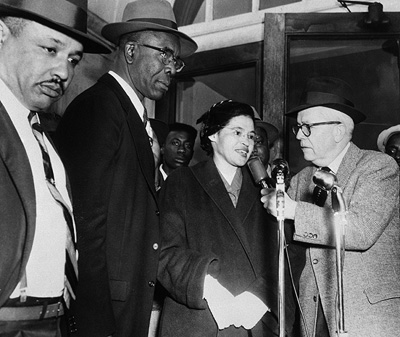Rosa Parks, born on February 4, 1913, was a Civil Rights icon. Today marks the 102nd anniversary of the birth of this dynamic woman. Parks is often noted for her pivotal role in sparking the Montgomery Bus Boycott in 1955. But, in order to appreciate her work and true legacy, we must recognize her activism and personage beyond that moment on the bus. Here are 7 things they aren't teaching you about Rosa Parks...
1. Her activism began before her arrest in 1955, and it continued long after.
As a field secretary for the Montgomery NAACP (and the only woman in the chapter), she investigated horrific accounts of gang rape and white violence throughout Alabama. She attended the Highlander Folk School, which was an education center for activism in worker’s rights and racial equality in Tennessee. For decades after her work for Civil Rights in Alabama, she continued her advocacy in Detroit as an aide for John Conyers, to whom she offered crucial assistance in his first campaign for congress. She also spent time fighting against housing and economic issues in the city.
2. She was not the first, or only, person arrested for refusing to give up her seat on a Montgomery bus.
There are many untold stories about Black people who refused to move when asked by bus drivers enforcing racist, segregationist practices. Claudette Colvin, Aurelia Browder, Mary Louise Smith, Susie McDonald, and Jeanette Reese were plaintiffs in a federal civil action lawsuit on Montgomery and Alabama’s bus segregation laws. Parks supported and worked towards building that case for those five women.
3. She was not old & “too tired” to move from her seat that evening in December.
In her autobiography, she brought truth to that myth that she was too tired from a long day of work. “I was not tired physically, no more tired than I usually was at the end of a working day. I was not old… I was forty-two. No, the only tired I was, was tired of giving in.” The act was not planned or pre-meditated. Rather, it was sparked by Parks’ personal indignation and commitment to justice.
4. She was an executive organizer in the Montgomery Bus Boycott.
Following her action on the bus, Rosa Parks became deeply involved in the Civil Rights Movement directly alongside other activists such as Ralph Abernathy, Bayard Rustin, Jo Ann Robinson, and Martin Luther King, Jr.
5. She was radical.
Often portrayed as soft-spoken, Mrs. Parks’ work in the Black Power Movement is often forgotten. She worked around issues of reparations, freedom for black political prisoners and economic justice. She is known mainly for her work in the Civil Rights Movement of the 60s, but her commitment to justice ran deep and she passionately supported the causes in which she believed.
6. She was forced out of Montgomery and to the North shortly after the boycott.
While the boycott was still going on, Parks and her husband lost their jobs. The constant threats of death and physical harm by those in and around Montgomery who did not appreciate her involvement in the Movement caused Parks to move with her husband to Detroit where she lived the rest of her life.
7. She was the first woman whose death was honored at the U.S. Capitol.
When she died at the age of 92 in 2005, Parks received a tribute normally reserved for statesmen and military leaders. Over 30,000 people paid their respects as her body was brought into the rotunda of the U.S. Capitol. Currently there is a statue in the Capitol building, unveiled in 2013.





